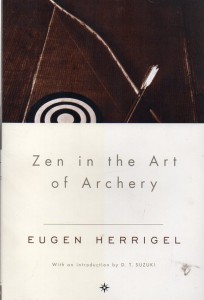Precio y stock a confirmar
Ed. Vintage, 1989. Size 20,5 x 13 cm. Used, excellent. 82 pages.
 By Daisetz T. Suzuki
By Daisetz T. Suzuki
Ipswich, Massachusetts May, 1953
One of the most significant features we notice in the practice of archery, and in fact of all the arts as they are studied in Japan and probably also in other Far Eastern countries, is that they are not intended for utilitarian purposes only or for purely aesthetic enjoyments, but are meant to train the mind; indeed, to bring it into contact with the ultimate reality. Archery is, therefore, not practiced solely for hitting the target; the swordsman does not wield the sword just for the sake of outdoing his opponent; the dancer does not dance just to perform certain rhythmical movements of the body. The mind has first to be attuned to the Unconscious.
If one really wishes to be master of an art, technical knowledge of it is not enough. One has to transcend technique so that the art becomes an «artless art» growing out of the Unconscious.
In the case of archery, the hitter and the hit are no longer two opposing objects, but are one reality. The archer ceases to be conscious of himself as the one who is engaged in hitting the bull’s-eye which confronts him. This state of unconsciousness is realized only when, completely empty and rid of the self, he becomes one with the perfecting of his technical skill, though there is in it something of a quite different order which cannot be attained by any progressive study of the art.
What differentiates Zen most characteristically from all other teachings, religious, philosophical, or mystical, is that while it never goes out of our daily life, yet with all its practicalness and concreteness Zen has something in it which makes it stand aloof from the scene of worldly sordidness and restlessness.
Here we come to the connection between Zen and archery, and such other arts as swordsmanship, flower arrangement, the tea ceremony, dancing, and the fine arts.
Zen is the «everyday mind,» as was proclaimed by Baso (Ma-tsu, died 788); this «everyday mind» is no more than «sleeping when tired, eating when hungry». As soon as we reflect, deliberate, and conceptualize, the original unconsciousness is lost and a thought interferes. We no longer eat while eating, we no longer sleep while sleeping. The arrow is off the string but does not fly straight to the target, nor does the target stand where it is. Calculation which is miscalculation sets in. The whole business of archery goes the wrong way. The archer’s confused mind betrays itself in every direction and every field of activity.
Man is a thinking reed but his great works are done when he is not calculating and thinking. «Childlikeness» has to be restored with long years of training in the art of selfforgetfulness. When this is attained, man thinks yet he does not think. He thinks like the showers coming down from the sky, he thinks like the waves rolling on the ocean; he thinks like the stars illuminating the nightly heavens; he thinks like the green foliage shooting forth in the relaxing spring breeze. Indeed, he is the showers, the ocean, the stars, the foliage.
When a man reaches this stage of «spiritual» develop¬ment, he is a Zen artist of life. He does not need, like the painter, a canvas, brushes, and paints; nor does he require, like the archer, the bow and arrow and target, and other paraphernalia. He has his limbs, body, head, and other parts. His Zen-life expresses itself by means of all these «tools» which are important to its manifestation. His hands and feet are the brushes and the whole universe is the canvas on which he depicts his life for seventy, eighty, or even ninety years. This picture is called «history».
Hoyen of Gosdzen (died 1140) says: «Here is a man who, turning the emptiness of space into a sheet of paper, the waves of the ocean into an inkwell, and Mount Sumeru into a brush, writes these five characters: so—shi—sai— rai—i. To such, I spread my zagu and make my profound bow».
One may well ask, «What does this fantastic pronouncement mean? Why is a person who can perform such a feat considered worthy of the utmost respect?» A Zen master would perhaps answer, «I eat when hungry, I sleep when tired». If he is nature-minded, he may say, «It was fine yesterday and today it is raining». For the reader, however, the question may still remain unsolved, «Where is the archer?»
In this wonderful little book, Mr. Herrigel, a German philosopher who came to Japan and took up the practice of archery toward an understanding of Zen, gives an illuminating account of his own experience. Through his expression, the Western reader will find a more familiar manner of dealing with what very often must seem to be a strange and somewhat unapproachable Eastern experience.
